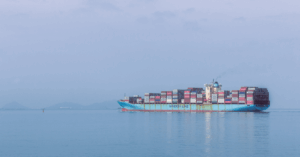1,500 Protesters Rally Against Maersk Ship Transporting F-35 Parts To Israel
Thousands of Moroccans took to the streets of Tangier and Casablanca on Sunday, protesting the planned arrival of a Maersk cargo ship believed to be carrying US fighter jet parts to Israel.
In Tangier, over 1,000 protesters gathered at various locations, starting their march around 4:30 p.m. local time from the Iberia Palace in the city center, about a 20-minute walk from the port.
Protesters held signs and chanted slogans like “The people want the ship banned” and “No genocidal weapons in Moroccan waters,” calling for the vessel to be denied entry.
The protest was aimed at the Maersk Detroit, which activists say was carrying F-35 warplane parts from the United States to Israel.
According to reports by Declassified UK, the cargo originated from the US Air Force Plant 4 in Fort Worth and was en route to the Israeli port of Haifa between April 5 and May 1.
The shipment was expected to be transferred at Tangier Med port to another Maersk vessel, the Maersk Nexoe, before reaching its final destination.
The Maersk Detroit was expected to dock at the Tangier Med Port in the early hours of Monday.
Though this industrial port complex is located nearly an hour from the city center, demonstrators still chose central Tangier for their protest.
Moroccan dockworkers and groups supporting the Palestinian cause released separate statements claiming the cargo included F-35 jet parts bound for Israel.
One well-known activist and founder of Morocco’s BDS (Boycott, Divestment and Sanctions) movement, Sion Assidon, said that their group had sent a letter to the government warning about the cargo, but felt their concerns were being ignored.
Protesters were also angry at foreign governments, especially the United States and France, blaming them for supporting Israel amid the ongoing war in Gaza.
The protest passed by the French embassy in Tangier, where Assidon criticized France for cracking down on pro-Palestinian movements and accused it of continuing colonial-era repression.
The march grew tense when authorities blocked demonstrators from passing near the American Legation, a historical building that once served as a U.S. embassy.
As police diverted the protest through Tangier’s narrow medina alleys, tensions rose, and some protesters accused authorities of deliberately confining them in tight spaces.
Skirmishes later broke out as some tried to breach police lines, especially near the Tangier City Port. The medina area was sealed off for four hours during the protest.
A similar protest took place across the Strait of Gibraltar in Algeciras, Spain, organised by a group called Cádiz for Palestine.
They condemned Maersk’s alleged involvement and called on Spanish authorities to block suspected weapons shipments to Israel at ports including Algeciras, Valencia, and Barcelona.
In fact, Spain had previously denied port access to a Maersk ship last year due to similar concerns.
Meanwhile, Maersk has denied transporting weapons or ammunition to Israel.
The company acknowledged it holds a contract with the US government and sometimes ships military-related equipment under US-Israeli security cooperation but insisted this specific shipment was not headed to Israel.
Instead, Maersk said the cargo was destined for other members of the international F-35 fighter jet program.
A statement from Morocco’s CGT General Union of Dock Workers and Port Personnel of the Gulf of Fos confirmed that all containers aboard the Maersk Nexoe had been inspected and showed no signs of carrying weapons or jet parts.
Moroccan media outlet Yabiladi also reported that inspections had not found any such items on the ship.
Despite these denials, protesters in both Tangier and Casablanca remained firm in their belief that Moroccan ports should not be used to assist what they called “genocidal operations” in Gaza.
A senior member of Morocco’s largest Islamist group, Al-Adl Wal Ihsane, Hassan Bennajeh, said the docking of such ships violates Moroccan sovereignty and ignores the will of its people.
Protesters once again called on the government to cut diplomatic ties with Israel, which were normalised in 2020 under the U.S.-brokered Abraham Accords.
Although Morocco has called for a permanent ceasefire in Gaza and condemned the violence, officials have not openly discussed ending the agreement.
Since the start of Israel’s war in Gaza following Hamas’s October 7, 2023 attack, which resulted in 1,218 Israeli deaths, mostly civilians, there have been multiple protests across Moroccan cities.
Reference: newarab, rfi

